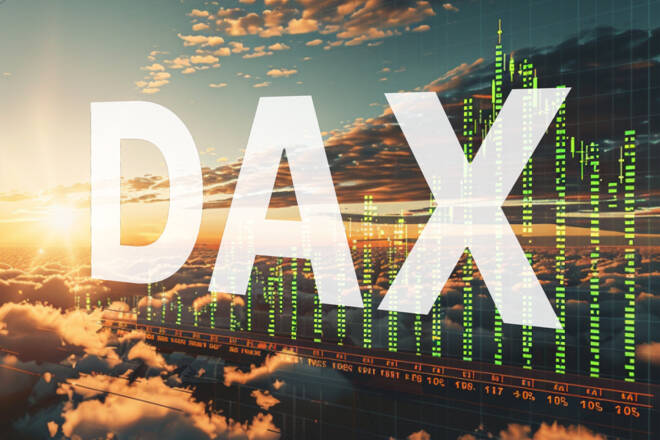Advertisement
Advertisement
DAX Index Today: Forecasting Trends Amidst US CPI and FOMC Commentary
By:
Key Points:
- The DAX slid by 1.32% on Tuesday, ending the session at 18,077.
- Caution about the US CPI Report and ECB monetary policy decision impacted buyer demand for DAX-listed stocks.
- On Wednesday, the US CPI Report and FOMC member commentary warrant investor scrutiny.
The Tuesday Overview of the DAX Performance
The DAX slid by 1.32%. Reversing a 0.79% gain from Monday, the DAX ended the session at 18,077.
Impact of the ECB Bank Lending Survey
On Tuesday, the ECB Bank Lending Survey garnered investor interest. Credit conditions remained tight while housing loan credit standards eased in the Eurozone.
Nonetheless, the demand for corporate loans tumbled, with housing loans also falling. The ECB attributed weak demand for credit to interest rate levels, housing market conditions, and the declining need for fixed investments among euro-area companies.
There were no economic indicators from Germany for investors to consider.
US Economic Calendar: RCM/TIPP Economic Optimism Index
On Tuesday, the RCM/TIPP Economic Optimism Index had a limited impact on investor sentiment. In April, the Index fell from 43.5 to 43.2. Economists forecast an increase to 44.2.
Investor attention remained fixed on the impending US CPI Report, which could influence speculations regarding a June Fed rate cut.
On Tuesday, the Dow declined by 0.02%. The Nasdaq Composite Index and the S&P 500 saw gains of 0.32% and 0.14%, respectively.
The Tuesday Market Movers
Rheinmetall AG tumbled 6.89% as investors reacted to a Goldman Sachs (GS) note on defense stocks. The note reportedly said,
“While our Portfolio Strategy team are relatively constructive on the European Defence outlook, they are not recommending EU Defense given the challenging valuation premium and recent outperformance.”
Deutsche Bank and Commerzbank saw losses of 1.95% and 1.04%, respectively. Bank stocks suffered as investors considered the ECB Bank Lending Survey. Falling demand for loans could impact net interest margins.
The risk-off sentiment also impacted auto stocks. Volkswagen and BMW saw losses of 1.07% and 0.78%, respectively. Mercedes Benz Group and Porsche declined by 0.56% and 0.04%, respectively.
ECB Commentary and Pre-ECB Jitters
On Wednesday, the investor focus remains on the ECB monetary policy decision. Economists expect the ECB to leave interest rates at 4.5% on Thursday. However, investors have raised bets on a June ECB rate cut.
Nevertheless, uncertainty lingers about whether the ECB would cut interest rates if the Fed hits the brakes on plans to cut interest rates.
Investors should monitor ECB member commentary throughout the session. Views on the timing of an ECB interest rate cut could move the dial. There are no economic stats for Germany or the Eurozone for investors to consider.
US Economic Calendar: CPI Report and FOMC Member Commentary
On Wednesday, the US CPI Report will warrant investor attention. Hotter-than-expected inflation numbers could impact bets on a June Fed rate cut. Falling bets on a June Fed rate cut may affect buyer demand for DAX-listed stocks.
Economists forecast the US annual inflation rate to rise from 3.2% to 3.4%. However, economists expect core inflation to fall from 3.8% to 3.7% in March.
With inflation in focus, investors should track FOMC member commentary. Reactions to the CPI Report and views on the timing of interest rate cuts could move the dial. FOMC members Michelle Bowman and Austan Goolsbee are on the calendar to speak.
Near-Term Outlook
Near-term trends for the DAX will likely depend on the US CPI Report, FOMC member commentary, and the ECB interest rate decision. Hotter-than-expected US inflation figures could influence ECB policy goals and impact the buyer demand for DAX-listed stocks.
In the futures, the DAX and the Nasdaq Mini were up 77 and 20 points, respectively.
DAX Technical Indicators
Daily Chart
The DAX held above the 50-day and 200-day EMAs, sending bullish price signals.
A DAX return to the 18,250 handle would support a move toward the April 2 all-time high of 18,567.
ECB chatter, the US CPI Report, and FOMC member commentary need consideration.
A fall below the 18,000 handle could give the bears a run at the 50-day EMA.
The 14-day RSI at 52.32 suggests a DAX return to the 18,500 level before entering overbought territory.
4-Hourly Chart
The DAX sat below the 50-day EMA while holding above the 200-day EMA, sending bearish near-term but bullish longer-term price signals.
A DAX break above the 50-day EMA could give the bulls a run at the 18,350 handle. A breakout from 18,350 could bring the all-time high, 18,567, into view.
Conversely, a break below the 18,000 handle could bring sub-17,800 levels into view.
The 14-period 4-hour RSI at 36.85 indicates a DAX fall below the 18,000 handle before entering oversold territory.
About the Author
Bob Masonauthor
With over 28 years of experience in the financial industry, Bob has worked with various global rating agencies and multinational banks. Currently he is covering currencies, commodities, alternative asset classes and global equities, focusing mostly on European and Asian markets.
Advertisement
